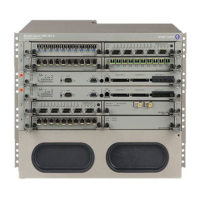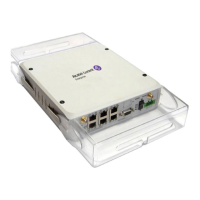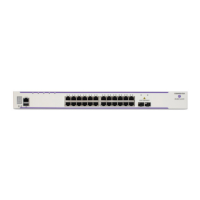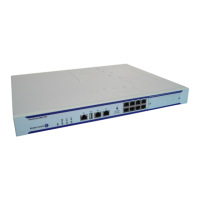Virtual Private Routed Network Services
7750 SR OS Services Guide Page 1011
authentication-policy
Syntax authentication-policy name
no authentication-policy
Context config>service>vprn>if
config>service>vprn>sub-if>grp-if
Description This command assigns an authentication policy to the interface.
The no form of this command removes the policy name from the group interface configuration.
Default no authentication-policy
Parameters name — Specifies the authentication policy name. If the string contains special characters (#, $,
spaces, etc.), the entire string must be enclosed within double quotes.
host
Syntax [no] host {[ip ip-address [mac ieee-address]} [subscriber sub-ident-string] [sub-profile
sub-profile-name] [sla-profile sla-profile-name]
no host {[ip ip-address] [mac ieee-address]}
Context config>service>vprn>if>sap
Description This command creates a static host for the SAP. Applications within the system that make use of static
host entries include anti-spoof, and source MAC population into the VPLS forwarding database.
Multiple static hosts can be defined on the SAP. Each host is identified by a source IP address, a
source MAC address, or both a source IP and source MAC address. When anti-spoof in enabled on
the SAP, the host information will be populated into the SAP’s anti-spoof table, allowing ingress
packets matching the entry access to the SAP. When the MAC address exists in the host definition,
the MAC address is populated into the VPLS forwarding database and associates it with the SAP. The
static host definition overrides any static MAC entries using the same MAC and prevents dynamic
learning of the MAC on another interface.
Defining a static host identical to an existing static host has no effect and will not generate a log or
error message.
Every static host definition must have at least one address defined, IP or MAC.
Static hosts may exist on the SAP even with anti-spoof and arp-populate (VPRN) features disabled.
When enabled, each feature has different requirements for static hosts.
anti-spoof — When enabled, this feature uses static and dynamic host information to populate entries
into an anti-spoof filter table. The anti-spoof filter entries generated will be of the same type as
specified in the anti-spoof type parameter. If the SAP anti-spoof filter is defined as mac, each
static host definition must specify a MAC address. If the SAP anti-spoof filter is defined as ip,
each static host definition must specify an IP address. If the SAP anti-spoof filter is defined as ip-
mac, each static host definition must specify both an IP address and MAC address. If definition
of a static host is attempted without the appropriate addresses specified for the enabled anti-spoof
filter, the static host definition will fail.
arp-populate — When enabled, this feature uses static and dynamic host information to populate
entries into the system’s ARP cache. This is only available on the VPRN service SAPs. Both a

